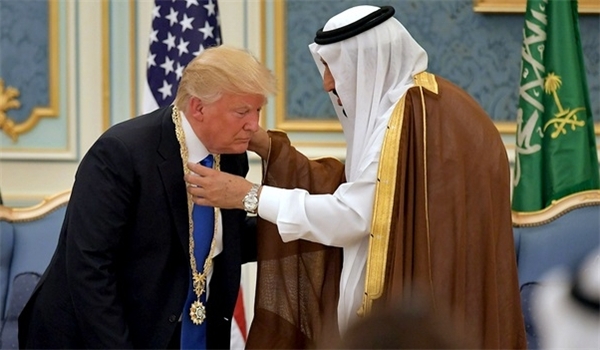
RNA - Nidal Sabi told TASS that the appointment in the hierarchy of the House of Saud royal family marks "the logical conclusion of the period of changes in the highest levels of the country’s governance".
"It is obvious that King Salman’s decision to appoint his son as a crown prince, which was approved by the majority of the Allegiance Council members, had been agreed on with Washington during US President Donald Trump’s visit to Riyadh in May," the expert explained.
Trump travelled to Saudi Arabia in May on the first leg of a tour, which then took him to Israel, sealing an arms deal with Riyadh worth $350 billion over 10 years, with nearly $110 billion to take effect immediately.
According to Sabi, Washington earlier bet on Prince Muhammad bin Nayef, the First Deputy Prime Minister and Interior Minister, who used to be the Crown Prince before being replaced by the king’s son.
"Prince Muhammad bin Nayef was considered to be pro-American, he enjoyed the absolute trust of the United States after al-Qaeda’s network had been suppressed in the kingdom," the expert pointed out.
The $110 billion arms deal signed by Saudi King, Salman bin Abdulaziz Al Saud, and Trump, according to US Secretary of State Rex Tillerson, was a component of $350 billion in economic and military investments between the two countries over the next 10 years.
For the Saudis, the deal is equally important, as it includes tanks, artillery, helicopters, light close air support, intelligence-gathering aircraft, and air defense systems such as Patriot and THAAD, among other things.
International Human rights groups slammed the deal, expressing concerns that sending the weaponry to Saudi Arabia will only worsen hostilities in Yemen. The organizations also voiced concerns over Saudi-led coalition attacks in Yemen, where Riyadh is killing civilians and fighting against Ansarullah fighters and supporters of the former Yemeni president, Ali Abdullah Saleh.
Also, Human Rights Watch disclosed that the coalition headed by Saudi Arabia has violated the rules of war, with some of its military action likely amounting to war crimes, including attacks on hospitals, markets, schools, and religious centers.
Besides Riyadh's intervention in Yemen, which killed at least 14,000 people, including hundreds of women and children, as well as Bahrain, the US and Saudi Arabia, along with a number of their regional allies, stand accused of providing weapons and funding various militant groups wreaking havoc in countries like Syria and Iraq.
847/940